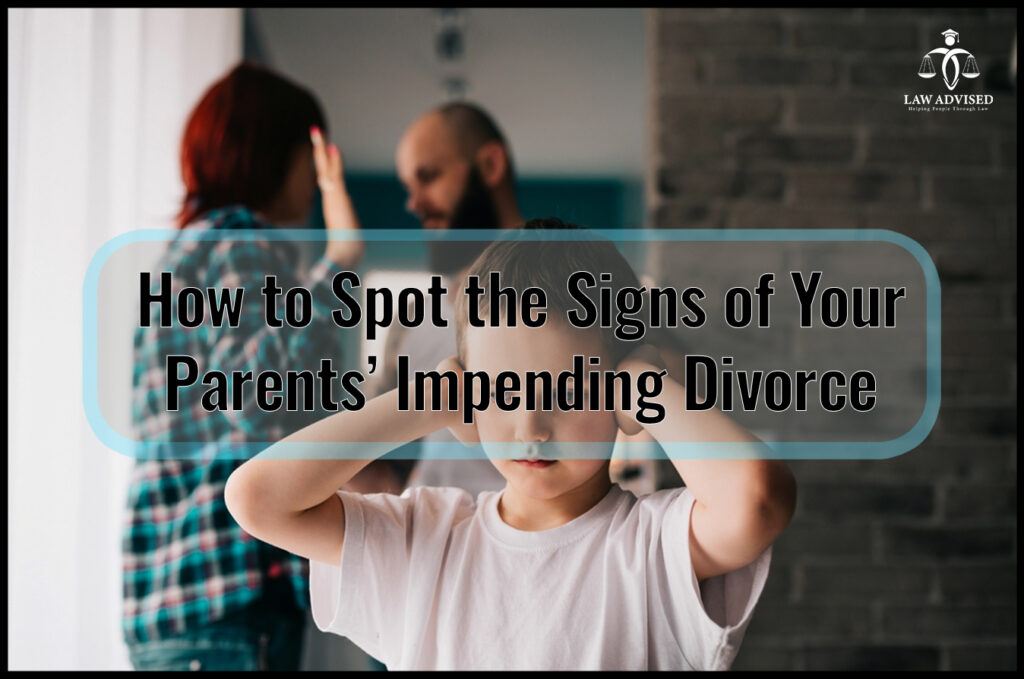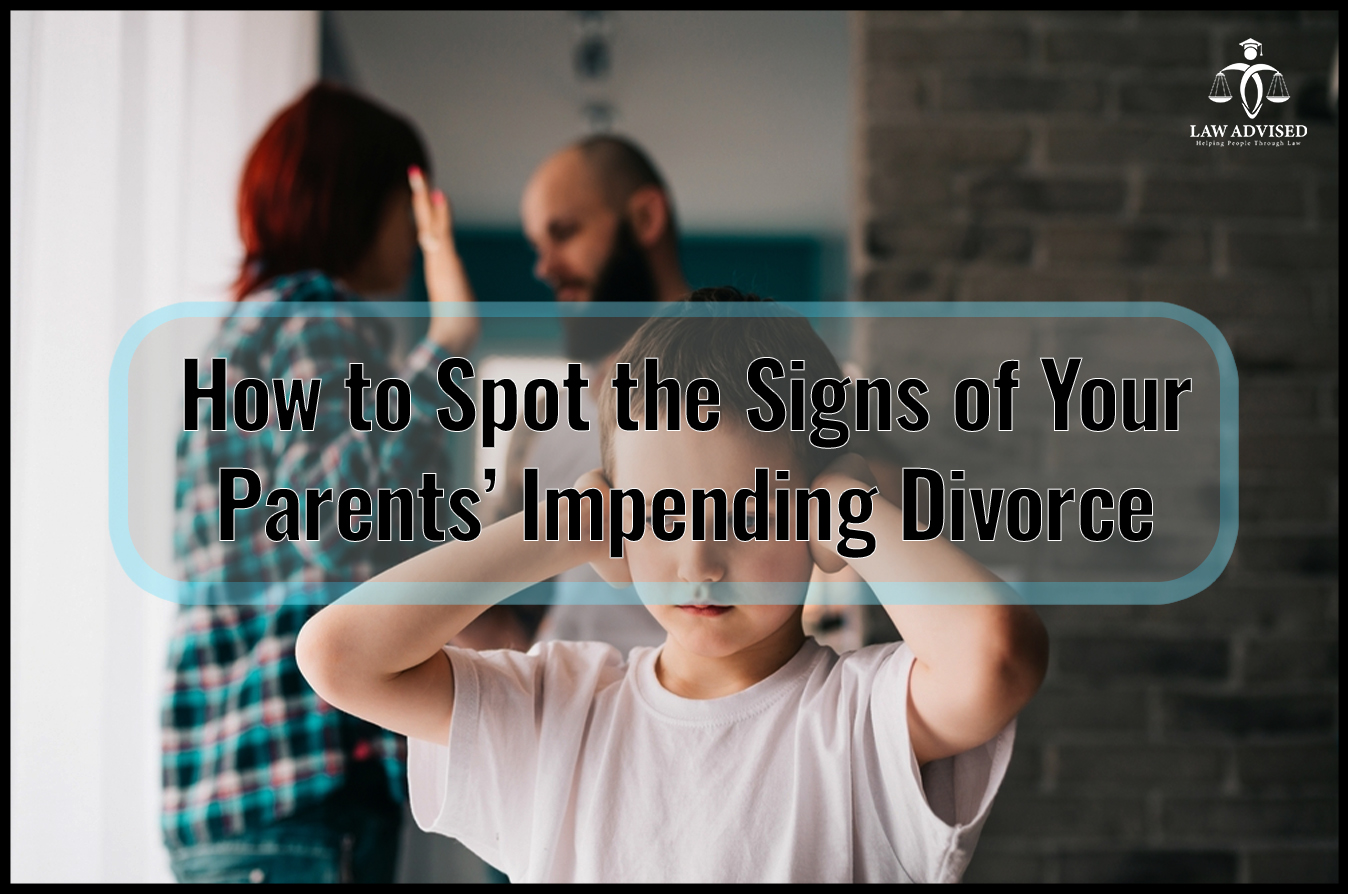To know if your parents are getting a divorce, look for signs of constant arguing, emotional distance, or secretive behavior. These indicators may suggest that their relationship is deteriorating and that they are considering separation.
Divorce can be a challenging experience for children, so it’s important to recognize the signs early on and seek support if needed. Growing up, parents serve as the foundation of a stable and loving family. However, there are times when relationships can become strained, leading to the possibility of divorce.
As a child, it can be distressing to witness your parents’ relationship deteriorate and ultimately reach a breaking point. If you are unsure about the state of your parent’s marriage, it is essential to be attentive to subtle changes in their behavior and communication. We will discuss some common signs that may indicate your parents are on the brink of divorce. By recognizing these signs early on, you can better understand the situation and take the necessary steps to cope with the challenges that lie ahead.
Recognizing Changes In Their Behavior
Recognizing changes in communication patterns can be an important indicator of whether your parents are getting a divorce. One noticeable change might be a decrease in affection and intimacy between your parents. They may no longer show physical or emotional affection towards each other as they used to. Another sign could be frequent arguments and tension in their interactions. They may argue more frequently and over seemingly trivial matters, creating a tense and hostile atmosphere.
Identifying Emotional Signs
Identifying emotional signs of divorce in parents can be challenging, but recognizing increased irritability and mood swings is often a telltale clue. It is not uncommon for individuals going through a divorce to experience heightened emotions, resulting in frequent mood swings and irritability towards family members, including their children. Another significant sign is expressing unhappiness or dissatisfaction with the current family situation.
Divorcing parents might verbalize their discontentment more frequently or demonstrate negative body language, such as slumped shoulders or sighing heavily. Moreover, withdrawal from family activities and engagement may occur as parents navigate the emotional complexities of divorce. They might pull back from participating in family outings, conversations, or shared hobbies. Understanding these emotional signs can help children and other family members provide support and assistance during this challenging time.
Noticing Changes In Their Interactions
Noticing changes in your parents’ interactions can be a sign that they are getting a divorce. Lack of cooperation and teamwork may become evident as they struggle to make decisions together or work as a unit. They may frequently argue or have difficulty finding common ground. Additionally, they may start avoiding spending time together and prefer to be alone or with friends instead.
This could indicate a desire for personal space or a lack of interest in their relationship. Another red flag is an increase in secretive behavior. They may start hiding things like phone calls, messages, or financial information, which can be a sign of a deteriorating relationship. It is important to observe these changes and communicate with your parents to understand their situation and offer support.
Financial Troubles And Disagreements
Financial troubles and disagreements are common signs that your parents may be heading towards a divorce. One indicator is frequent financial disagreements. Couples who are struggling financially may find themselves regularly arguing over money matters such as budgeting, spending, and saving. These arguments can become more intense and frequent as the financial situation worsens.
Another sign is when there are drastic changes in spending habits. If you notice your parents suddenly start spending excessively or engaging in impulsive buying, it could be a sign of financial stress and potential marital issues. These changes may be a way for one or both parents to cope with their unhappiness in the relationship.
Financial secrets and hidden assets can also indicate marital problems. If you discover that one or both of your parents are keeping financial information hidden from each other, such as secret bank accounts or undisclosed debts, it may be a red flag that they are contemplating divorce.
Alterations In Household Dynamics
When parents are going through a divorce, one of the first signs may be a decreased involvement in household chores and responsibilities. Suddenly, one parent may start to neglect their usual duties or take on fewer responsibilities. This shift in the household dynamic can be indicative of a larger issue.
Another noticeable change may be changes in living arrangements. Divorce often leads to one or both parents moving out of the family home, resulting in a rearrangement of living spaces. This can be particularly jarring for children who are used to a stable and predictable environment.
In addition to altered living arrangements, the introduction of new routines and schedules can also signal that a divorce is imminent. Parents may start implementing different schedules for visitations or extracurricular activities, causing a disruption to the established family routine.
While these changes in household dynamics may be challenging for children to navigate, recognizing these signs can help provide support and understanding during a difficult time.

Impact On Children’s Behavior And Emotions
Divorce can have a profound effect on children, causing changes in their behavior and emotions. One area that may be affected is their academic performance. It is common for children of divorced parents to experience difficulty concentrating on their schoolwork, leading to a decline in grades.
In addition to academic struggles, children may also exhibit increased anxiety or depression. The breaking up of their family unit can be emotionally distressing, leading to feelings of sadness, fear, and uncertainty. These emotions can manifest in various ways, such as a loss of interest in activities they once enjoyed or difficulty sleeping.
Another common response to parental divorce is acting out or rebellious behavior. Children may become more defiant, engaging in arguments with authority figures or breaking rules. They may also seek attention through negative behaviors, hoping to divert attention away from the family situation.
It is important for parents and caregivers to be aware of these potential changes in behavior and emotions and to provide support and understanding for their children during this challenging time.
Family Dynamics And Relationships
Divorce can be a trying time for families, impacting the dynamics and relationships within the household. Tension and conflict among family members often arise as emotions run high. Family traditions and rituals may also undergo significant changes, as the structure and dynamics shift. This can be particularly evident during special occasions or holidays when families traditionally come together to celebrate.
Furthermore, siblings may experience divided loyalties and alliances, as they navigate their way through their parents’ divorce. It is not uncommon for children to feel caught in the middle, torn between their parents, and unsure of where their loyalties lie. These changes can be indicators that your parents are going through a divorce, and it’s important to provide support and understanding during this challenging time.
Talking To Trusted Adults
If you suspect that your parents may be getting a divorce, it can feel overwhelming and confusing. One helpful step is to reach out to trusted adults who can provide guidance and support. Engaging with a school counselor or teacher can be a great option, as they have experience in dealing with sensitive family situations. They can offer advice and connect you with resources that can help you navigate this difficult time. Another option is to seek advice from a close family member or friend who you trust. They can provide a listening ear and offer their perspective on the situation.
Additionally, finding support through online communities and forums can be beneficial. Connecting with others who have gone through similar experiences can help you feel less alone and provide valuable advice and coping strategies. Remember, it’s important to reach out for support and surround yourself with people who can help you through this challenging time.
Professional Help And Resources
|
Frequently Asked Questions On How To Know If Your Parents Are Getting A Divorce
How Can You Tell If Your Parents Are Getting A Divorce?
Recognizing signs of emotional distance, frequent arguments, or discussions about separation can indicate potential divorce.
What Are Common Signs Of Marital Problems In Parents?
Common signs include increased conflict, decreased communication, changes in routine, and parental stress impacting family dynamics.
Why Do Some Parents Choose To Hide A Divorce From Their Children?
Parents might hide divorce to protect children from stress, maintain stability, or shield them from potentially negative emotions.
How Can Divorce Affect Children In The Long Term?
Divorce can impact children’s emotional well-being, self-esteem, relationships, academic performance, and overall development in the long term.
What Should You Do If You Suspect Your Parents Are Getting A Divorce?
It is crucial to communicate openly with your parents, express your concerns, seek support from trusted individuals, and consider professional help if needed.
Can Parents Get Back Together After Filing For Divorce?
While parents can reconcile, the likelihood depends on numerous factors, such as the reasons for divorce and personal willingness.
How Can You Cope With The Emotional Challenges Of Your Parents’ Divorce?
Finding healthy outlets, seeking counseling, talking to friends or support groups, and focusing on self-care can help cope with emotional challenges during a divorce.
How Can Parents Ensure A Smooth Transition For Their Children During A Divorce?
Open communication, reassurance, maintaining routines, allowing for emotional expression, and prioritizing the children’s well-being can help facilitate a smooth transition during a divorce.
Conclusion
To sum up, it can be distressing to witness your parents going through the process of divorce. However, by observing the signs such as frequent arguments, emotional distance, or changes in their behavior, you can get a sense of the situation.
It is important to remember that every family is different, and communication is key. If you suspect your parents are getting a divorce, seeking guidance from a trusted adult or counselor can offer support during this difficult time.
Ismail Hossain is the founder of Law Advised. He is an Divorce, Separation, marriage lawyer. Follow him.





Leave a Reply